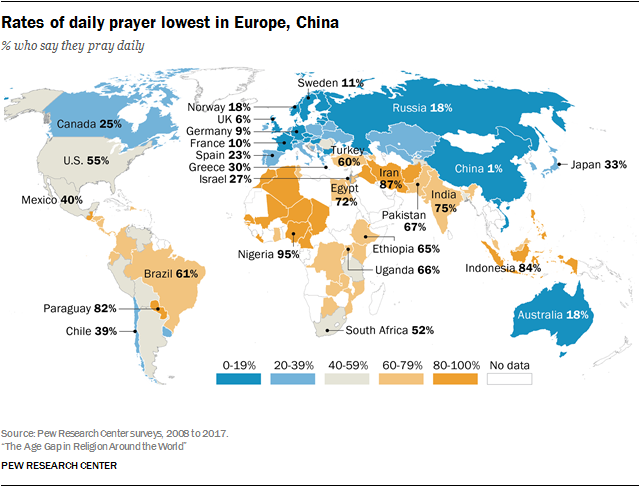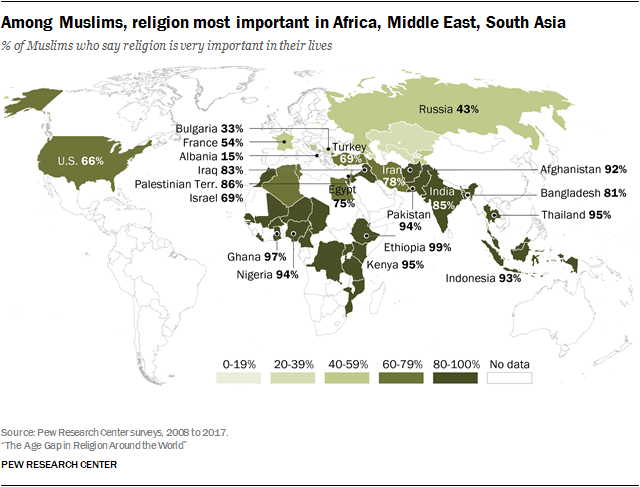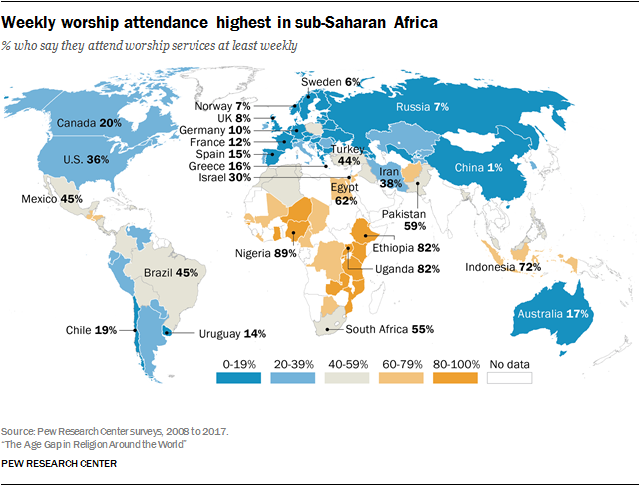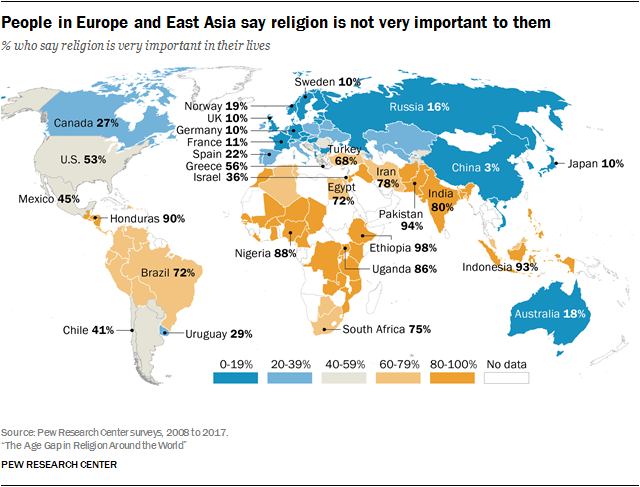Religion: Difference between revisions
| Line 95: | Line 95: | ||
* from [https://www.pewresearch.org/religion/2018/06/13/how-religious-commitment-varies-by-country-among-people-of-all-ages/|Pew Research: 3. HOW RELIGIOUS COMMITMENT VARIES BY COUNTRY AMONG PEOPLE OF ALL AGES] | * from [https://www.pewresearch.org/religion/2018/06/13/how-religious-commitment-varies-by-country-among-people-of-all-ages/|Pew Research: 3. HOW RELIGIOUS COMMITMENT VARIES BY COUNTRY AMONG PEOPLE OF ALL AGES] | ||
==== Worldwide rates of daily prayer rates ==== | |||
<html><a href="https://www.pewresearch.org/religion/2018/06/13/how-religious-commitment-varies-by-country-among-people-of-all-ages/pf-06-13-18_religiouscommitment-03-09/"><img src="https://www.pewresearch.org/religion/wp-content/uploads/sites/7/2018/06/PF.06.13.18_religiouscommitment-03-09-.png?w=640"></a> | |||
</html> | |||
==== Worldwide importance of religion rates ==== | |||
<html><a href="https://www.pewresearch.org/religion/2018/06/13/how-religious-commitment-varies-by-country-among-people-of-all-ages/pf-06-13-18_religiouscommitment-03-07/"><img src="https://www.pewresearch.org/religion/wp-content/uploads/sites/7/2018/06/PF.06.13.18_religiouscommitment-03-07-.png?w=640"></a> | |||
</html> | |||
==== Worldwide weekly religious attendance rates ==== | |||
<html><a href="https://www.pewresearch.org/religion/2018/06/13/how-religious-commitment-varies-by-country-among-people-of-all-ages/pf-06-13-18_religiouscommitment-03-08/"><img src="https://www.pewresearch.org/religion/wp-content/uploads/sites/7/2018/06/PF.06.13.18_religiouscommitment-03-08-.png?w=639"></a> | |||
</html> | </html> | ||
==== Worldwide religion importance rates ==== | |||
<html><a href="https://www.pewresearch.org/religion/2018/06/13/how-religious-commitment-varies-by-country-among-people-of-all-ages/pf-06-13-18_religiouscommitment-03- | <html><a href="https://www.pewresearch.org/religion/2018/06/13/how-religious-commitment-varies-by-country-among-people-of-all-ages/pf-06-13-18_religiouscommitment-03-05/"><img src="https://www.pewresearch.org/religion/wp-content/uploads/sites/7/2018/06/PF.06.13.18_religiouscommitment-03-05-.png?w=640"></a> | ||
</html> | </html> | ||
Revision as of 15:32, 19 February 2024
Religion
Origins & cultural practice[edit | edit source]
Explaining the world[edit | edit source]
World and human origins[edit | edit source]
- Humans naturally want to know "why"
- Why are we here?
- religions and founding myths usually intersect
- What is our purpose?
- religions
Purpose of life[edit | edit source]
- a primary function of religion is to order daily life
- religion may guide
- social structures
- political structures
- class, profession, and other hierarchies
- note that the word "hierarchy" originally means "rank in the sacred order" (see heirarchy word origin (etymonline)
Reflect or reinforce social structures[edit | edit source]
- religious belief provides authenticity and legitimacy to political, social and cultural systems or structures
- ex.:
- across human history, hereditary rule (especially monarchy) is the most stable political system
- because the "first born" of the ruler is selected by God/gods
- therefore the first born is legitimized by belief in that God/gods
- because the "first born" of the ruler is selected by God/gods
- across human history, hereditary rule (especially monarchy) is the most stable political system
Mitigating Uncertainty[edit | edit source]
Ritual[edit | edit source]
- burial
- sacrifice
- purpose
- types of sacrifice
- animal sacrifice
- human sacrifice
Superstition[edit | edit source]
- 13 and Friday the 13th superstitions
- many ancient counting systems, especially Babylonian, were 12-base
- therefore 13 marked a bad number
- in Christianity, Judas was considered the 13th disciple at the Last Supper
- since he betrayed Jesus, 13 is associated with him
- it is likely that the prejudice against pre-existed the story of the Last Supper and Judas
- many ancient counting systems, especially Babylonian, were 12-base
- see:
Prehistoric[edit | edit source]
- animism
- polytheism
Paleolithic[edit | edit source]
- conceptual thought
- spirituality
- examples
- cave paintings
- pictograms
- figurines
- Venus figurine
- lion man
- totemism
Neolithic[edit | edit source]
- examples
- ritual burial
- megaliths
Ancestor Worship[edit | edit source]
- Neolithic origins *
Mythology[edit | edit source]
Polytheism[edit | edit source]
Organized Religions[edit | edit source]
- listed in approximate chronological order of development
Hinduism[edit | edit source]
Zoroasterism[edit | edit source]
Bhuddism[edit | edit source]
Abrahamic religions[edit | edit source]
Judaism[edit | edit source]
- Old Testament
Christianity[edit | edit source]
- New Testament
Islam[edit | edit source]
Worldwide religiosity[edit | edit source]
Pew Research 2018 worldwide survey[edit | edit source]
Worldwide rates of daily prayer rates[edit | edit source]
Worldwide importance of religion rates[edit | edit source]
Worldwide weekly religious attendance rates[edit | edit source]
Worldwide religion importance rates[edit | edit source]
Teaching religion[edit | edit source]
- Religion Pedagogy & Teaching Strategies
- Example of religious teaching: Catholic Catechism (rejoiceinmary.org)



